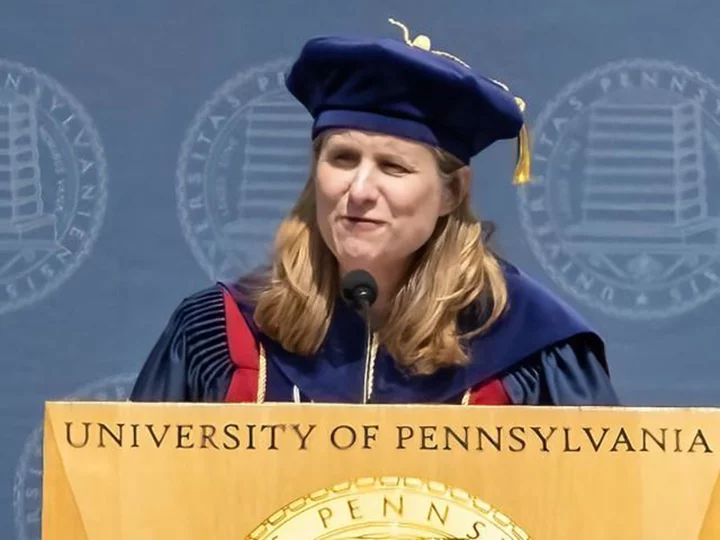When University of Pennsylvania President Liz Magill was tapped for the post just 18 months ago, she was heralded as the "clear consensus" to lead the Ivy League university.
Today that consensus is nowhere to be found. In trying to placate everyone on the contentious issues of antisemitism, Palestinian rights, free speech and academic freedom, she has angered high-profile and deep-pocketed donors and trustees, many of whom resigned and pulled their funding in recent days.
It's quite a change in standing for the woman with the gold-plated resume who was tapped last year to be the 27th leader of the nearly 300-year old school once led by Benjamin Franklin. (Despite its name, the university is a private institution, not a state school.)
She came to UPenn after serving as the provost, the number two administrative post, at the University of Virginia, where she had previously attended law school. She joined the law school faculty there immediately after serving as a clerk to Supreme Court Justice Ruth Bader Ginsburg. Before her time as Provost at UVa, she served as Dean of Stanford Law.
But now a former UPenn trustee is calling on her to resign; some donors are announcing they have closed their checkbooks because of the decision to allow speakers that Penn's administration acknowledged had a history of making antisemitic remarks to participate in the Palestine Writes Literature Festival on campus last month.
Criticism of that event, and the university's response, has surged since the Hamas attack on Israel sparked the war there earlier this month. Some donors are also calling for her resignation. She's also under attack from those on campus who feel she's not doing enough to protect academic freedom in the face of attacks on the festival.
Magill did not respond to CNN's request to the University for an interview.
A family of lawyers
Born in Fargo, North Dakota, Magill comes from a family of lawyers, with her father serving as a Federal Court of Appeals judge appointed by President Ronald Reagan. Her brother is a state court judge in Minnesota. And her husband is an environmental lawyer.
She told the Daily Pennsylvanian, the school paper, that she had not planned to pursue any kind of legal career. She was a history major as an undergraduate at Yale University, and she planned to pursue a PhD in history and then a career in teaching after graduation.
But when she finished college she instead worked as a legislative assistant to Kent Conrad, the Democratic US senator from her home state of North Dakota. Her work with Conrad centered around energy policy and regulation research, and that led her to an interest in government and regulatory law and, eventually, to UPenn.
Now it's not clear that Magill will be able to survive the controversy.
Vahan Gureghian, a former member of the board of trustees who voted to appoint Magill, resigned from the board late last week in protest to the handling of the Palestine Writes festival. He is saying the decision to pick her was a mistake.
"She is negligent and not really up to the job of being the president of one of the eight or so most elite universities in the world," Gureghian, a charter-school magnate, told CNN in a phone interview on Wednesday.
And major donors are voicing objections as well, and speaking with their dollars. Mark Rowan, CEO of private equity giant Apollo Global Management, is among those calling for the ouster of both Magill and Board of Trustees chairman Scott Bok over the Palestine Writes festival.
On September 12, ahead of the Palestine Writes festival and weeks before the outbreak of war in Israel and Gaza, Magill and other top university administrators issued a statement acknowledging the accusations of antisemitism being made against some of the speakers at the event.
"We unequivocally -- and emphatically -- condemn antisemitism as antithetical to our institutional values," said the statement. But it added that "as a university, we also fiercely support the free exchange of ideas as central to our educational mission. This includes the expression of views that are controversial and even those that are incompatible with our institutional values."
That not only angered critics of the event, but also those who felt it undercut the principals and practice of free speech and academic freedom on campus. A letter signed by 36 members of faculty at the school criticized that statement.
"It is equally important for us as educators to declare our support for Palestinian artists and writers, making it clear that we condemn antisemitism as well as Islamophobia and the oppression of Palestinians," said the letter sent from the faculty members before the festival was held.
Request to 'Amend your statement'
"We ask that as leaders of the Penn community, you immediately amend your statement so that it is clearly in support of a diversity of views and diversity of religious, racial, and cultural communities on campus."
On Wednesday Magill issued a new statement to try to bring the two sides together.
"Hateful speech has no place at Penn. No place. I categorically condemn hateful speech that denigrates others as contrary to our values," Magill said. "In this tragic moment, we must respect the pain of our classmates and colleagues and recognize that our speech and actions have the power to both harm and heal our community. We must choose healing, resisting those who would divide us and instead respect and care for one another."
Magill got a vote of support from one major donor, Jon Gray, president of asset manager Blackstone, who told Bloomberg Thursday he would continue to make donations to UPenn in support of low-income students and cancer research , despite his concerns about antisemitism.
"Some of my colleagues in the financial field and more broadly have raised some really legitimate concerns about hate speech masquerading as free speech in the context of antisemitism on college campuses at Penn and other places," Gray said in an interview on Bloomberg Television. As for Magill, he said, ""I think she's a good person. I don't think she's antisemitic."So far Magill has the support of the school's board of trustees.
"The unanimous sense of those gathered was that President Magill and her existing University leadership team are the right group to take the University forward," said board Chairman Bok.
But It's not clear if Magill, or Bok, will remain, given the clout of donors who are unhappy with the handling of the controversy so far.
-- CNN's Matt Egan contributed to this report









